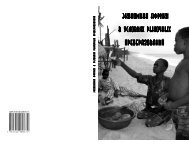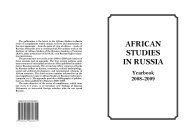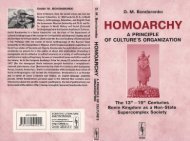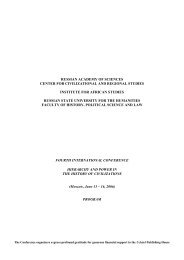L. Fituni, I. Abramova Resource Potential of Africa and Russia's ...
L. Fituni, I. Abramova Resource Potential of Africa and Russia's ...
L. Fituni, I. Abramova Resource Potential of Africa and Russia's ...
Create successful ePaper yourself
Turn your PDF publications into a flip-book with our unique Google optimized e-Paper software.
This inevitably motivates the United States <strong>and</strong> the "united<br />
Europe" to prevent a deeper cooperation between Russia <strong>and</strong> <strong>Africa</strong><br />
in the field <strong>of</strong> resources. At the same time, one should not reduce the<br />
complex global raw-materials policy to attempts to keep Russia out<br />
<strong>of</strong> <strong>Africa</strong> or exclude it from <strong>Africa</strong>. As seen by Russia <strong>and</strong> <strong>Africa</strong>,<br />
the problem is whether the competitors recognize as legitimate their<br />
right to have their own national interests in the area <strong>of</strong> raw-materials<br />
<strong>and</strong> protect them.<br />
The abrupt change in the situation in world raw materials markets<br />
that occurred in 2008 as a consequence <strong>of</strong> the current monetary<br />
crisis is bound to affect the future <strong>of</strong> the economic situation <strong>of</strong> <strong>Africa</strong>n<br />
countries. Should the post-effects <strong>of</strong> the current financial crisis<br />
prove protracted (this is the most likely scenario), they would have<br />
fewer opportunities to sell their manufactured goods <strong>and</strong> buy raw<br />
materials in <strong>Africa</strong>.<br />
We should keep in mind that monetary crises follow a certain<br />
cycle: they arise, grow, reach the peak <strong>and</strong> peter out sooner <strong>of</strong> later.<br />
At the same time, global shortages <strong>of</strong> raw materials are long-term<br />
<strong>and</strong> systemic. Hence the problems will be growing <strong>and</strong> causing a<br />
tougher competition for <strong>Africa</strong>'s raw materials.<br />
Thus, the new tussle for <strong>Africa</strong>'s resources is <strong>of</strong> a strategic nature<br />
<strong>and</strong> is going to be protracted. Most probably <strong>and</strong> despite their<br />
desperate resistance, the old players would have to surrender some<br />
<strong>of</strong> their economic positions on the continent to new rivals. We are<br />
almost certain that, at least during the next decade, the positions <strong>of</strong><br />
China, India, Russia, Brazil <strong>and</strong> a number <strong>of</strong> other countries in <strong>Africa</strong><br />
will be growing stronger. Concurrently, there will be a growing<br />
competition between the old players – above all between the USA<br />
<strong>and</strong> EU countries – to once again confirm that the concept <strong>of</strong> a unipolar<br />
world is untenable <strong>and</strong> show that many "economic poles" are<br />
trying to grab <strong>Africa</strong>n resources to advance their own interests. As<br />
for Russia, it ought to assess the actual advantages <strong>of</strong> cooperation<br />
with <strong>Africa</strong> in the field <strong>of</strong> raw materials <strong>and</strong> to re-embark the once<br />
successful course <strong>of</strong> multifaceted <strong>and</strong> mutually beneficial cooperation<br />
with the continent, to whose freedom from colonialism Moscow<br />
has contributed so much.







